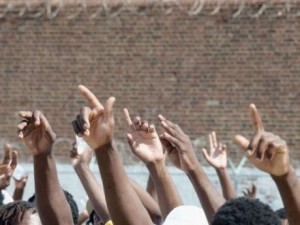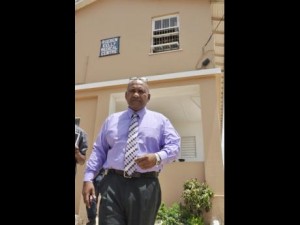
Voices From the Inside: JFJ Explores the Humanity of Jamaicans Behind Bars
November 3rd, 2015
Jamaicans have been talking a lot about prisons, in recent weeks. Many have moved on now to talk about hospitals; but the many issues surrounding our prisons remain, even if we put aside the brouhaha surrounding British Prime Minister David Cameron’s recent visit.
A few weeks ago, I attended a public forum organized by Jamaicans for Justice (JFJ) on “Human Rights Issues Facing Prisoners and Detainees in Jamaica’s Criminal Justice System.” It was a wide-ranging program, with an interesting and diverse line-up of speakers, and would probably have been best presented as a half-day or even full-day seminar, rather than an evening event.
I missed an important section on safeguarding the rights of children in conflict with the law; but I hope to return to this in the near future. I did learn, however, that the average length of stay in a lock-up for a child (where he/she would be held with adults) is seven days; by law, it should not be longer than 24 hours. Why have we still not got this right? And by the way, there have been 73 cases of attempted suicide by children in detention in the first nine months of this year. We should be ashamed. Something is very wrong.
It was the voices of three Jamaicans that I heard the loudest. These voices insisted to me that while the physical conditions that prisoners endure are appalling, the mental pressures are in many ways harder to cope with. Struggling to maintain one’s dignity and one’s sense of self-worth (if any yet remains) in this place, with little or no support, can scar you for life.

Prisoners at the Tower Street Correctional Centre enjoy a concert by Shaggy in May, 2013. (Photo: Norman Grindley/Gleaner)
I have visited the Tower Street Adult Correctional Centre a few times. It is a real shock to the senses. After passing through the security area, which is cold and impersonal, one enters a large courtyard. This is now as personal as you can get: the lives of well over a thousand men, squeezed into a building that is literally Dickensian (Tower Street was built in the mid-nineteenth century). The sights, sounds (and smells) overwhelm you. Voices call in all directions, washing hangs on makeshift lines, the sun burns. It is disturbing, confusing, frightening.
Jason Barrett served thirteen years at Tower Street for robbery and firearm possession. He described with painful intensity the over-crowded cell he inhabited with three others. “I would not keep any of my animals like that,” he said. Tower Street was built to house 650 male occupants; nowadays it holds around 1,700. Two cell occupants have to sleep in hammocks, and new, inexperienced prisoners often fall from them during the night. He himself hurt his back after falling. Mr. Barrett recalled with some bitterness one correctional officer’s comment when he sought medical help: “He couldn’t dead, man?” He does not appear to have been joking.
“I am not less human than you are,” Jason Barrett wanted to tell the uncaring warders; but “them not interested.” This level of callousness began to affect him. “Anxiety disorder is not a simple thing,” he said, without any trace of self-pity.
Sheryl Bailey, who was incarcerated at the Fort Augusta women’s prison, echoed Mr. Barrett’s words. “There are not enough people interested in you,” she stated simply. “Correctional officers are…not professional.” She recounted the traumatic experience of strip searches, which are designed to humiliate inmates, she felt. For Ms. Bailey, there was also this sense of being a “nobody,” ignored, worthless. The worst thing, she commented, is that you carry this “nothingness” with you even when you are released. Once you come out, there is the stigma. “You’ve done paid the penalty already,” she observed, “but you are still being punished.”
Again, there was a mental health toll. “You need to have a firm head,” Ms. Bailey asserted. She also cited the importance of a “strong family background” – a support system. “Otherwise, when you come out, you’re lost.”
George Young is a member of the non-governmental organization Stand Up for Jamaica, which does excellent rehabilitation work in prisons. Prisoners who are wheelchair-bound, he said, are often excluded from remedial classes due to lack of access to the spaces where such activities took place. There are enough security concerns even among able inmates, he noted; disabled inmates are more vulnerable. Health issues – such as high blood pressure, hypertension and diabetes – are not addressed. There are no special diets available for prisoners with such ongoing conditions; and no special sleeping arrangements. The “pressure wounds” endured from sitting in the wheelchair… Well, disabled prisoners simply have to put up with the pain.
Members of the LGBT community are always the last in line for health services such as seeing the dentist. For their own protection, gays are housed on a “special block.” If any of them get sick, they have to stay on the block and not in the prison hospital, and are denied medical attention. Condoms are not distributed in prisons.

Senior Superintendent Reuben Kelly is in charge of the St. Catherine Adult Correctional Centre and a 39-year veteran of the Correctional Services. (Photo: Jermaine Barnaby/Gleaner)
Yet, despite all the physical suffering…“It’s the mindset” that is most important, Mr. Young concluded. These three speakers all agreed: If inmates were treated like human beings, life in prison would be more bearable. There would be respect, decency…and hope. The inmates who spoke all acknowledged that they had not been angels and had made serious mistakes in their lives; but they had paid for it.
There was much praise, however, for a particular correctional officer, Senior Superintendent Reuben Kelly, now in charge of the St. Catherine Adult Correctional Centre. The consensus was that SSP Kelly brings fairness and wisdom to his job. Perhaps in officers like the forward-thinking SSP Kelly there resides hope for the future – and some solutions, too.
JFJ Chairman Horace Levy reminded us, “Our rights come from the human worth of each of us. And human rights are for all.”
Yes, for each and every Jamaican, not for some Jamaicans. When are we going to realize? “All” really does mean “all.”
Tags: Correctional Services, disabilities, Fort Augusta, Horace Levy, human rights, Jamaicans for Justice, JFJ, LGBT community, prisoners, Reuben Kelly, St Catherine Adult Correctional Centre, Stand Up for Jamaica, Tower Street Adult Correctional Centre
The Gleaner reserves the right not to publish comments that may be deemed libelous, derogatory or indecent.
To respond to The Gleaner please use the feedback form.
2 Responses to “Voices From the Inside: JFJ Explores the Humanity of Jamaicans Behind Bars”
- We Are the Zoomers
- Living Online with Humans and Birds: NAOC 2020
- Human Trafficking and the Problem of Public Education
- Down Memory Lane
- Are We Ready to Recover from COVID-19?
- Road Safety Matters: Is Your Vehicle Safe?
- Sexual Harassment, Me Too, and the Minister’s Disturbing Giggle
- The Vulnerable Senior Citizens, Private Care Homes and COVID-19
- A Muddle Over Masks
- Here is Something Life-Saving You Can Do: Give Blood!



[…] Fellow blogger Emma attended a Jamaicans for Justice forum at which this was discussed. Here’s an excerpt and check out the full post here: […]
Thanks very much for sharing, Kate!